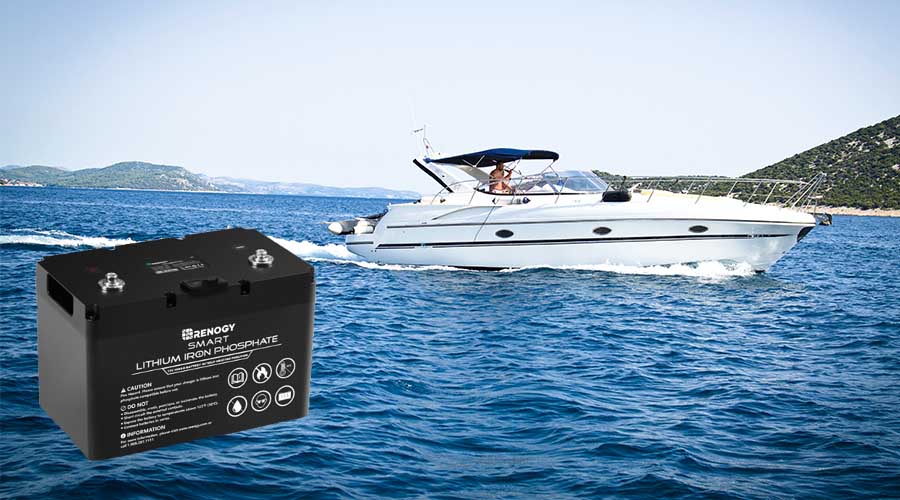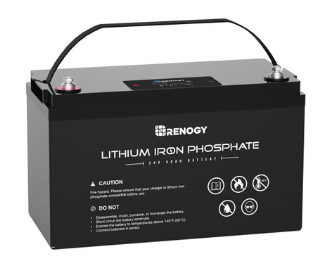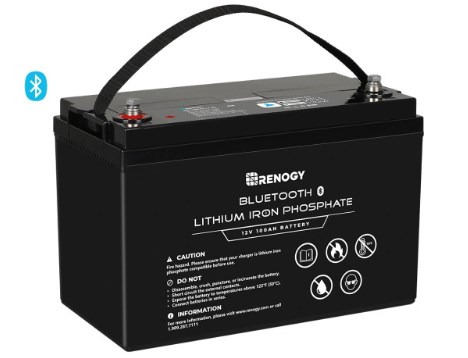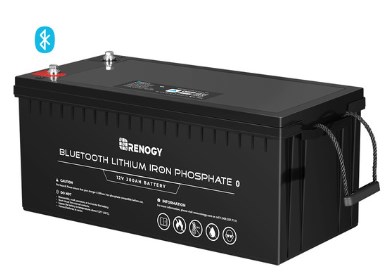
Choosing the Right Marine Battery
When embarking on boating, having the right marine battery with you is one of the things you don't want to skip on your list. Whether you're out on the water for a day of fishing or taking a long voyage, your marine battery is what powers your boat's electrical systems and keeps everything running smoothly.
But how do you choose a marine battery that matches your boat? What are the types of marine batteries available? And which marine battery is the best? These and many other questions are discussed in this blog. You will also learn why it is important to choose Renogy marine battery.
What Is Marine Battery?
A marine battery is a specialized type of battery designed to provide reliable power in the harsh marine environment. They are an essential component of any marine electrical system, providing power for everything from navigation lights to pumps and motors.
Marine batteries come in various sizes and capacities to suit the needs of different types of vessels, from small fishing boats to large yachts and commercial ships. And with their rugged construction, reliable performance, and long lifespan, marine batteries are crucial for anyone who spends time on the water.
Types of Marine Batteries
Marine batteries are available in three major types: deep cycle, starting, and dual-purpose. Here is how each of them functions:
Deep cycle
Marine deep cycle batteries are a type of battery designed to provide consistent power over a long period. These batteries are typically used in boats and other marine applications where a reliable power source is needed for a prolonged time.
Unlike traditional automotive batteries, marine deep cycle batteries are built to withstand repeated deep discharges, which is important for powering onboard electronics and other equipment.
They are available in various types, including lead-acid, AGM, and lithium-ion deep cycle marine batteries, each with its benefits and drawbacks.

Deep cycle batteries
Choosing the best deep cycle marine battery for your needs requires careful consideration of factors like capacity, voltage, and discharge rate, as well as your budget and the specific demands of your application.
Starting battery
Marine starting batteries are a type of battery perfect for a high burst of power for starting a boat's engine. Unlike deep cycle batteries, which are designed for extended use over a longer period of time, marine starting batteries are built to deliver a quick burst of energy to start the engine and then recharge quickly to be ready for the next start.
They are typically made of lead acid and come in various sizes and capacities to fit different engine types and sizes.
Dual-Purpose Battery
Marine dual-purpose batteries are a type of battery that serves two purposes - starting the engine and powering other electrical devices on board a boat. These batteries are a hybrid of marine starting and deep cycle batteries, providing the high burst of power needed to start the engine while also providing sustained power over a longer period.
What Is The Best Marine Battery?
While marine batteries are categorized into types depending on their functions, they are also grouped according to their manufacturing methods. This gives birth to lithium, flooded, and AGM batteries.
However, you might be lost in knowing which option is the best marine battery for your boat. Here are what to know about each type:
| Lithium Batteries | AGM Batteries | Flooded Batteries | |
|---|---|---|---|
| Price | $$$ | $$ | $ |
| Long Term Cost | $ | $$$ | $$$$ |
| Lifespan | 15-20 Years | 6-10 Years | 3-5 Years |
| Charge Cycles | 2000+ | 500 | 300 |
| Safety | Safest | Less Safe | Less Safe |
| Maintenance | No Maintenance | Less Maintenance | Most Maintenance |
Lithium Marine Batteries
Lithium marine batteries are a type of battery that uses lithium-ion technology to provide power for marine applications. These batteries are popular for their high energy density, long lifespan, and lightweight design.
Another force that adds to the popularity of lithium batteries in the marine industry is their ability to provide reliable power for both starting and deep cycle applications. However, they are typically more expensive than traditional lead-acid batteries and may require special charging equipment.
- Pros
On the positive side, lithium batteries for boats offer a high energy density, which means they can provide more power in a smaller package.
Also, lithium batteries have a longer lifespan than lead-acid batteries. This means your lithium battery can serve you longer than other marine battery options. It is also worth mentioning that lithium boat batteries are lighter in weight.
- Cons
However, there are some downsides to consider as well.
One, as mentioned earlier, lithium batteries are typically more expensive than traditional batteries, and they may require special charging equipment.
Additionally, there have been some concerns about the safety of lithium batteries, although these risks can be mitigated with proper care and maintenance.
Ultimately, deciding on using a lithium marine battery will depend on your specific needs and budget.
Flooded Marine Batteries
A flooded marine battery is a lead-acid battery that uses a liquid electrolyte solution to generate and store energy. These batteries are commonly used in marine applications because they are relatively inexpensive and can tolerate various temperatures and charging conditions.
- Pros
One of the advantages of flooded marine batteries is that they are more affordable than other types of batteries and can provide reliable power for your boat.
Also, they can withstand different temperatures and don't easily react to charging conditions.
- Cons
Flooded batteries have their share of cons too.
One, flooded batteries require regular maintenance to ensure they function properly.Two, these batteries can be prone to spills or leaks if not handled carefully. Hence, it is worth considering the long-term costs and benefits before making a final decision.
AGM Marine Batteries
An AGM marine battery is another option to consider when choosing the best battery for your boat or marine vessel. Absorbed Glass Mat (AGM) battery is a type of sealed lead-acid battery that is also commonly used in marine applications.
Unlike flooded marine batteries, marine AGM batteries do not require regular maintenance and are less prone to spills or leaks. They also have a longer lifespan and can be discharged and recharged multiple times without losing capacity.
- Pros
There are several advantages to using an AGM marine battery, such as its sealed design that eliminates the need for regular maintenance and reduces the risk of spills or leaks. Also, AGM batteries have a longer lifespan.
- Cons
AGM batteries are typically more expensive than flooded marine batteries. Hence, it might not be the best for you if you are on a tight budget.
What Makes Renogy's Batteries Outstanding for Marines?
Today, the marine industry is flooded with batteries from different brands. This can make it difficult to know where to start with your search. However, Renogy is a reliable marine battery brand that has bought a name for itself in the marine space.
Renogy batteries for marine are a great battery for your marine use, thanks to their outstanding features. Here are a few reasons to choose Renogy marine batteries:
|
|
|
|
|
|
Battery name |
|||
|
Price |
539.99 (Save $146.00) |
459.99 (Save $240.00) |
899.99 (Save $400.00) |
|
Longevity(Cycle Life) |
≥3500 Cycles @ 80% DoD |
2000 Cycles 80%DOD |
2000 Cycles 80%DOD |
|
Connection Method |
Parallel(Up to 8) |
Parallel(Up to 8) |
Parallel(Up to 8) |
|
BMS Protection |
Advanced BMS |
Advanced BMS |
Advanced BMS |
|
Communication Port |
RS485 |
Bluetooth |
Bluetooth |
|
Waterproof |
IP65 |
IP65 |
IP65 |
|
Application |
yacht, marine, and Van |
yacht, marine, and Van |
yacht, marine, and Van |
|
Warranty |
3 Materials/Workmanship |
3 Materials/Workmanship |
3 Materials/Workmanship |
IP65 Waterproof
IP65 waterproof is a rating that indicates that a marine battery is protected against dust and low-pressure water jets from any direction. A marine battery that carries this rating means it can withstand water exposure without being damaged, making it a good choice for marine environments where moisture and humidity are common.
Fortunately, Renogy understands the importance of this rating and hence provides its products with IP65 waterproof.
Self-Heating -AND- Smart Energy Saving Mode
Another feature that distinguishes Renogy batteries from other batteries is their self-heating ability. Self-heating is a necessary feature for the smooth performance of marine batteries.
Self-heating is a technology that helps keep the battery warm in cold temperatures, which can help extend the battery's life and improve performance. And since boat batteries are used in colder environments, this feature becomes necessary.
Also, Renogy marine batteries come with a smart energy-saving mode, which helps conserve energy by automatically adjusting the battery's power output based on the current load. This feature can also help extend the battery's life and reduce the risk of overcharging or overheating.
Remote Monitoring: Bluetooth
Remote monitoring via Bluetooth is another feature that can be found in some marine batteries, and we are proud to equip our batteries with this great feature.
Remotely monitoring your battery allows you to connect it to a smartphone or other device and monitor its status, including its current charge level and any alerts or warnings that may indicate an issue.
This can be especially useful for boaters who want to keep an eye on their battery's health and performance from a distance.


Battery Management System
Another reason you want to choose a Renogy battery for your marine adventure is the ability to monitor and control your battery's charging process, thanks to BMS.
The Battery Management System (BMS) is a crucial component of marine batteries. It is responsible for monitoring and controlling the battery's charging and discharging processes and protecting it from overcharging, over-discharging, and other potential issues.
The BMS uses advanced algorithms and sensors to optimize the battery's performance and extend its lifespan, ensuring it delivers reliable power when needed.
What Are the Components Of Marine Battery Systems?
A marine battery system typically consists of several components. They include:
Battery: the primary power source that stores energy in chemical form and releases it as electrical energy when needed. This component receives energy from the charger and stores it to release it when you need to power your boat.
Battery Charger: a device that converts AC power from a shore power source or generator into DC power to charge the battery. Once the charger converts AC power to DC, it sends it to the battery to store.
Inverter: the function of this component is to convert DC (Direct Current) power from the battery into AC (Alternating Current) power to run AC-powered devices onboard. While your battery charger converts AC to DC, an inverter converts your battery's DC energy back to AC to power devices that run on AC.
DC-to-DC Converter: a device that converts DC power from the battery into a different voltage or current level to power devices with different power requirements.
Solar Panels: this component converts sunlight into DC power to charge the battery and power onboard devices. A solar panel is usually a plus to a marine battery system, as it ensures you can leverage the sun's energy to power your vessel.
Alternator: a device that converts mechanical energy from the engine into DC power to charge the battery while the engine is running.
Circuit Breakers and Fuses: These components protect the battery and other components from over-current, short circuits, and other electrical faults.
Here are some of our kits to consider for these components:
 |
 |
 |
|
| Solar Kits | 200 Watt 12 Volt Solar Starter Kit | New 200 Watt 12 Volt Solar Premium Kit | |
| Package Includes |
How Long Do Marine Batteries Last?
The question of how long a marine battery last has no single answer. The lifespan of marine batteries can vary depending on various factors such as materials, usage, maintenance, and storage. For example, how often you use your battery has a say in how long your battery serves you. Plus, the condition of using your battery will tell how long it lasts.
As mentioned above, we could refer to the comparison table of different batteries, and it can be seen that the battery with the longest life is a lithium battery, which is more than 10-years. It is important to regularly check and maintain your battery to ensure it lasts as long as possible.
How to Get the Best Performance for Your Batteries?
Marine batteries are not cheap, and your battery failing means getting a new one, which you want to avoid. Hence, you want to know what you can do to get the best performance for your battery.
Fortunately, there are a few measures to keep your battery healthy and have the best performance:
Manufacturer's Instructions: the first step to getting the best from your battery is to read the manufacturer's instructions. Marine batteries come with instructions on how to use them properly.
Regular Use: one of the best ways to get the best performance from your battery is to use it regularly, as batteries left unused for long periods can deteriorate faster.
Proper Storage: keep your boat battery clean and dry, as moisture or dirt can cause damage.
Avoid Overcharging: avoid overcharging or undercharging your batteries, as this can affect their lifespan.
Regular Check: it is a best practice to always keep an eye on your marine battery. Your battery functioning doesn't mean nothing is wrong with it. A marine battery might be failing while still powering your boat. You must always check if everything is in order. You can also hire a technician for a more detailed check.
Charge Properly: failure to charge your battery properly can cause damage to your battery in the long run. Hence, ensure you charge your marine battery as stipulated by the manufacturer.

How to Charge a Marine Battery?
Charging your battery correctly will ensure it is healthy, and you can get the best performance from it.
Disconnect: to charge a marine battery, you must first ensure that the battery is disconnected from all electrical sources.
Connect the charger: the next step is to connect the charger to the battery, making sure to match the positive and negative terminals correctly.
Set the charging rate: Next, set the charger to the appropriate charging rate according to the battery's specifications.
Monitor the charging process: monitor the battery's temperature and charging progress, and disconnect the charger once the battery is fully charged.
Remove charger: while most marine battery comes with a BMS feature that helps monitor the charging process, it is a best practice to remove the charger once your battery is fully charged.
What is Marine Battery Group Size?
Marine Battery Group Size refers to the physical dimensions of a marine battery.
Marine batteries are in different dimensions, and what size is adequate for one marine use might be different from what is needed for another.
Hence, it is important to choose the correct group size for your boat to ensure that the battery fits securely and functions properly. The group size is typically indicated on the battery label or in the manufacturer's specifications.

Most common battery groups and dimensions
(Source: https://www.batteryequivalents.com/)
FAQs
Q1: Can lithium batteries be used for engine starting?
Yes!
Lithium batteries can be used for engine starting. Starting batteries are available in different types, and lithium batteries are one. Lithium batteries are often used as a lightweight and high-performance alternative to traditional lead-acid batteries.
However, it is important to ensure that the lithium battery is compatible with the specific engine and that proper safety precautions are taken when installing and using the battery.
Q2: Symptoms of a Failing Marine Battery
As a boat owner, it's important to recognize the symptoms of a failing marine battery. Knowing when your battery is failing lets you ditch it for a new one to prevent damage to your boat's electrical system.
Symptoms of a failing marine battery include difficulty starting the engine, dimming lights, and a slow or inconsistent crank.
If you notice any of these signs, it's recommended to have the battery tested and possibly replaced. Remember to always prioritize safety when dealing with any type of battery.
Q3: What Is the Right Voltage for Your Marine?
Knowing the right voltage for your marine vessel is important when choosing a marine battery.
To determine the right voltage for your marine vessel, you will need to refer to the owner's manual or consult with a professional marine electrician. The appropriate voltage will depend on the specific make and model of your vessel and the electrical components you plan to use.
It is important to ensure the voltage is compatible with your equipment to avoid any damage or malfunction. And don't hesitate to seek expert advice to ensure the safety and efficiency of your marine electrical system.
Q4: What's the difference between a marine battery and a regular battery?
The main difference between a marine battery vs. car battery is that a marine battery is designed to handle the harsh marine environment, such as vibration, moisture, and corrosion. Depending on the type, marine batteries can also provide a steady and consistent flow of power over a longer period, while regular car batteries are designed to provide short bursts of power.
Additionally, marine batteries are built with thicker plates and more robust construction to withstand the demands of marine use.
Overall, using the appropriate battery for your marine vessel is important to optimize performance and longevity.
Q5: Is there a difference between deep cycle and marine battery?
There is a difference between deep cycle and marine batteries. As mentioned above, a deep-cycle battery is a subset of a marine battery. Please see: What is a marine battery.

Conclusion
Investing in a high-quality marine battery is essential for any boater. The right battery will not only serve you longer but also make your boating experience smoother.
This guide has provided you with the necessary information needed to pick the right battery for your marine adventure.
When choosing a marine battery, consider the type, capacity, and maintenance requirements. Also, always check your battery for symptoms of failure so you can know when your battery is failing.
If you have any questions that this guide doesn't touch, kindly contact Renogy, and our ever-available team will be glad to help.















